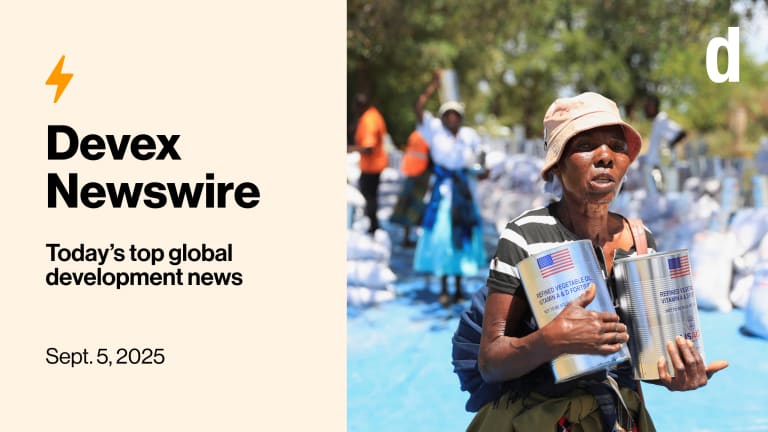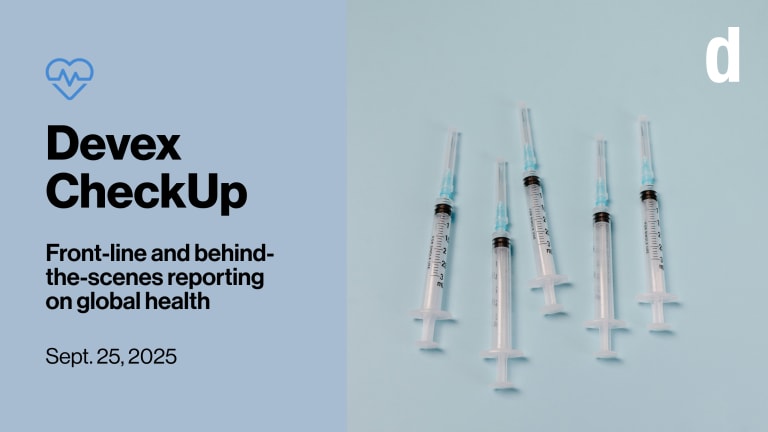
For the final day of Devex Pro Week, we look at how Christian Aid’s pivot to localization captures the way international NGOs are scrambling to adapt as aid cuts bite, staff are slashed, and collaborations expand. Plus, we have a new report that analyzes the top 50 U.S.-based INGOs’ earnings. With heavy dependence on U.S. grants, is the old Big Aid model gone for good?
Also in today’s edition: We examine concerns over the latest draft of the U.N. political declaration on noncommunicable diseases.
+ With the aid landscape changing so rapidly, how do we build the INGOs of tomorrow? Join us today at noon ET (6 p.m. CET) as we find answers and chart the way forward with a panel of visionary leaders who are already reimagining what's possible. Register now, and if you can’t attend live, we’ll send you a recording.
INGO stars
Christian Aid stunned the sector in April with a big shift: closing country offices and channeling money to local partners through five regional hubs. “We’re talking about our future role being that of a catalyst, connector, and convener,” says CEO Patrick Watt.
While Christian Aid's transformation was a year in the making, it’s still part of a wave of change as aid budgets collapse, writes reporter Elissa Miolene.
“We're in this situation now, so we can either lament and navel-gaze, or we could think: okay, how can we get through this?” says Rachel Wilkinson of the International Civil Society Centre.
The cuts have been brutal. Over seven months, the U.S. slashed tens of billions, including 83% of USAID programs. That’s left INGOs scrambling. FHI 360 lost $400 million and half its staff, while Save the Children shed 40% of its workforce. Localization is also accelerating — it’s not just Christian Aid that has upped the focus on shifting power to local players.
The crisis is also driving unlikely collaboration. Save the Children, Mercy Corps, and CARE are pooling surge capacity for disasters. “If we do it together, it’s faster, more efficient, more effective,” says Save the Children US CEO Janti Soeripto. Still, others are wary — FHI 360 CEO Tessie San Martin notes that two distressed organizations can just combine into one big distressed organization, and that doesn’t necessarily fix anything.
Still, the old Big Aid model looks finished — and INGOs are looking to move with the times.
“We all knew that we needed to change,” says San Martin, “and now we all have to change.”
Read: After the aid cuts — what's next for INGOs? (Pro)
Further reading: Merge, adapt, or close? How might nonprofits respond to tough times? (Pro)
+ Listen: In the latest episode of our weekly podcast, Devex’s Adva Saldinger, David Ainsworth, and Colum Lynch discuss how emerging donors are reshaping the aid landscape and other top development stories from this week.
Where the money is
The 50 biggest U.S.-based INGOs pulled in a combined $27.5 billion in their latest tax filings, according to an exclusive new Devex report. But the picture isn’t rosy: Overall income fell 3.3% in real terms, with 26 groups losing a total of $2.3 billion, while 24 managed a $1.4 billion bump.
The numbers predate Washington’s sweeping aid cuts, but obviously that has been a massive bombshell as well. Our analyst Miguel Antonio Tamonan finds that 18 of the 50 rely on government grants for at least half their income — most of it likely from the United States.
Direct Relief once again tops the list at $2.4 billion. Newcomer Edesia was the fastest riser, more than doubling income to $191.2 million. Meanwhile, World Central Kitchen — the previous edition’s star climber — saw the steepest drop, with revenue plunging 57.7% from $587.4 million to $248.7 million.
Download the report: The 50 largest US INGOs in 2025 — and where they get their money (Pro)
+ This report is part of Pro Week — five days of content and events dedicated to our Pro members. Not yet gone Pro? To celebrate, we have a limited-time offer of $100 off an annual Devex Pro membership. Sign up now before the offer ends.
Mozambique’s girls fight back
At Bagamoyo village in central Mozambique, a girl drew laughter as she warned that bald, potbellied men were threatening her generation — part of a Princess Girls Club lesson on saying no to early marriage and pregnancy.
“If you move around here, you will realize that girls are marrying at a very young age. We would want to reduce that. But we also want all of them to have access to reproductive health,” says Iotacia Malate, program officer at Tsogolo Tsicana, which works with rural girls and women.
The challenge is stark: More than half of Mozambican girls marry before 18, and only a third of women use modern contraceptives. Across the East and southern Africa region, adolescent pregnancy rates are double the global average. “Despite progress, 49 million women … want to avoid pregnancy but are not using modern contraception,” says Dr. Stephen Mupeta, the United Nations Population Fund’s regional family planning specialist.
For 26-year-old Sonia Arnaldo, the issue is personal, writes David Njagi for Devex. Pregnant as a teen, she left school and faced stigma. With Tsogolo Tsicana’s support, she launched a salon, returned to class, and now champions family planning. “I never knew anything about family planning. But now I know … how to take care of myself,” she says.
But donor cuts have put progress at risk. The Trump administration’s withdrawal of $377 million from UNFPA triggered youth-clinic closures and supply shortages. “Funding cuts have had a large impact … leading to the closure of youth-friendly clinics, disruption of supply chains, and a reduction in health worker capacity,” says Mupeta.
With more than half of Mozambique’s health budget reliant on aid, shortages persist. “With less funding, the country is experiencing regular medicine shortages and hurdles in distributing available medicines,” says Alex Bertil, head of public health in Tete, a province in Mozambique.
Still, local leaders stress the way forward: stronger domestic funding, secure supply chains, and youth-led initiatives. “The youth-friendly services are an eye-opener for the girls to take control of their health,” says Birgit Holm, executive director of ADPP Mozambique. Or, as Dr. Isac Mapossa at Changara hospital puts it: “This is really changing our young girls and making them take control of their lives.”
Read: How aid cuts are unraveling family planning progress in Mozambique
Petering out
Advocates fear the latest draft of the U.N. political declaration on noncommunicable diseases, or NCDs, is losing steam. Once ambitious, it’s now watered down — with targets dropped, language softened, and whole measures cut, writes Senior Reporter Jenny Lei Ravelo.
Take health taxes. An earlier pledge for 80% of countries to boost excise taxes on tobacco, alcohol, and sugary drinks has been swapped for a vague call to adopt “policies and legislative, regulatory and fiscal measures.” Sugary beverage taxes? Gone. “That was a really strong, clear commitment … it’s really taken out a key measure that could be so important,” says Alison Cox, policy and advocacy director at the NCD Alliance.
Cox points out the irony: Health taxes not only cut risks tied to NCDs, they also generate revenue. Yet industry lobbyists are clearly in play. “They use all the usual sort of playbook tactics,” she says, citing a Tax Foundation report that questioned tobacco taxes — from a group with ties to Philip Morris.
Other targets have also been stripped, such as integrating NCDs and mental health into preparedness plans — despite evidence from COVID-19 that they should be included. “It makes absolute sense that you would be sort of building considerations for that vulnerability,” Cox says. Financial protection goals have also been scaled back, from 80% of countries to just 60%.
Negotiations aren’t over, but civil society is worried things could get worse. If the targets are taken out altogether, it would leave the spine of the declaration “ripped out of it,” Cox warns. Nandita Murukutla, vice president at Vital Strategies, adds: “Every opportunity we have to reinforce what works … is important. So we can’t afford to neglect it.”
Read: NCDs political declaration risks watered-down ambitions
+ For more insider reporting on global health, sign up for Devex CheckUp, a free, weekly newsletter.
In other news
An appellate court has declined to review a challenge to U.S. President Donald Trump’s order to withhold billions in foreign aid, but it has opened a path for aid groups to continue the challenge in a lower court. [New York Times]
Four countries in Africa will soon run out of ready-to-use therapeutic food, used to treat severely malnourished children, due to aid cuts. [Reuters]
The U.N. Security Council voted Thursday to extend the U.N. Interim Force in Lebanon’s mandate until December 2026, with peacekeepers set to withdraw by the end of 2027. [France 24]
Sign up to Newswire for an inside look at the biggest stories in global development.
Search for articles
Most Read
- 1
- 2
- 3
- 4
- 5








